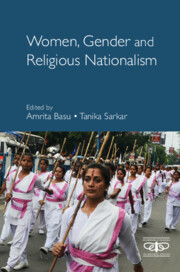Book contents
- Frontmatter
- Dedication
- Contents
- List of Abbreviations
- Introduction: Women of Hindu Rashtra
- Part I Changing Modalities of Hindu Nationalist Organizing
- Part II Gendered Techniques of Mobilization: The Sangh and the Samiti
- Part III Cultivating Women’s Militancy: The Vishva Hindu Parishad
- Part IV Refashioning Gender and Sexuality
- Part V Alternative Activist Responses to the Hindu Right
- Glossary
- About the Contributors
- Index
9 - The Defence of Aacharaam, Femininity and Neo-Savarna Power in Kerala
Published online by Cambridge University Press: 12 August 2022
- Frontmatter
- Dedication
- Contents
- List of Abbreviations
- Introduction: Women of Hindu Rashtra
- Part I Changing Modalities of Hindu Nationalist Organizing
- Part II Gendered Techniques of Mobilization: The Sangh and the Samiti
- Part III Cultivating Women’s Militancy: The Vishva Hindu Parishad
- Part IV Refashioning Gender and Sexuality
- Part V Alternative Activist Responses to the Hindu Right
- Glossary
- About the Contributors
- Index
Summary
Introduction
On 28 September 2018, the Supreme Court (SC) of India struck down the prohibition of women of menstruating ages in the forest-shrine of Sabarimala in Kerala as gender discrimination and a variant of untouchability (Indian Express 2018a). Subsequently, brahmin and kshatriya temple authorities, the sudra community organization known as the Nair Service Society (NSS) and the Sangh Parivar organizations organized protests against the judgment. However, much before the SC verdict even as the matter was in court, in 2016, a group of Malayali women had already created a high-decibel campaign on social media called #ReadyToWait (RTW), which announced their determination to preserve the custom at Sabarimala that disallowed women of menstruating ages as pilgrims (IndiaFacts 2016). Their campaign proved so successful that this prohibition of women of menstruating ages in Sabarimala began to stand for Hinduism in general; soon, the denial of the former was perceived as tantamount to the rejection of the latter. The campaign grew even more powerful in the days following the verdict and was important in bringing many educated and upper- or middle-class women with no direct exposure to Hindutva ideology closer to politics focused on ‘Hindu interests’. The confrontation between the Kerala government led by the Communist Party of India (Marxist) (CPM) and the forces of caste privilege and Hindutva in Kerala deeply polarized civil society; the confrontation was marked by several incidents of violence (Roopesh 2018).
Through this examination of the RTW discourse, I hope to address the relative absence of Malayali women in the burgeoning literature on women in conservative Hindutva formations. There are a few studies on the growing public religiosity and piety of Hindu women in Kerala (Jennet 1999; Warrier 2005; Sreedhar 2016; Thomas 2018; Dempsey 2001). But for the most, Malayali women are viewed within the frame of social development in social science and historical literature in twentieth-century Kerala. In the debate about the achievement of remarkable social development in Kerala despite the state's poor economic growth in the twentieth century (commonly referred to as the ‘Kerala Model’ debate; R. Jeffrey 2003), women figured mainly as positive, rational, domestic agents of change who benefited unequivocally from the social transformation of the twentieth century.
- Type
- Chapter
- Information
- Women, Gender and Religious Nationalism , pp. 265 - 300Publisher: Cambridge University PressPrint publication year: 2022



